Q&A: Answers to your questions about Italy's updated travel rules
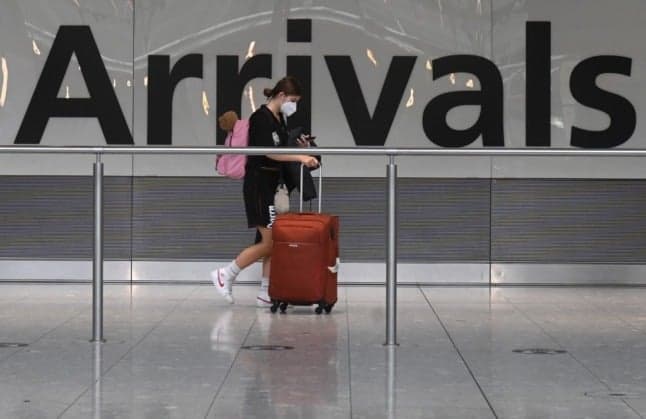
Italy has updated its travel rules, with the latest guidance in place until December 15th. Here we take a look at what this means and answer your questions about some of the issues that affect you the most.
This article was last updated on October 28th.
Italy's health ministry has updated its rules on international travel, after a previous ordinance introduced at the end of August expired on October 25th.
The new rules, which came into force on October 26th and will remain in place until December 15th, broadly extend the ordinance, with only minor changes in place for travellers from most countries.
What has changed?
As of August 31st, passengers from the US, Canada, Japan and Israel have had to show proof of vaccination or recovery from Covid-19 plus a negative test result to avoid quarantining on arrival (previously only one of the two had been required).
This rule remains broadly the same, but the updated ordinance names only the US, Canada and Japan as countries from which passengers may present a recovery certificate in lieu of proof of vaccination.
Passengers travelling from Israel are now included among all other List D countries, meaning only a vaccination certificate showing the holder has undergone a full vaccination cycle for at least 14 days will be accepted as valid.
With the new ordinance, a number of countries have also been moved from the less-restricted List D to the more-restricted List E.
Albania, Armenia, Bosnia and Herzegovina, Brunei, Lebanon, Moldova, Montenegro, Republic of North Macedonia, and Serbia all appear to have been removed from List D in the latest ordinance, joining the “Rest of World” in List E.
Meanwhile Bahrain, Chile, Kuwait, Rwanda, and Uruguay are new List D appearances, meaning travel is now allowed from these countries for tourism purposes.
Travel to Italy from List E countries is not permitted for tourism, but only for work, health, or study reasons, to return to a place of registered residence, or to reunite with an Italian citizen or resident with whom the passenger has a proven and stable relationship.
A ten-day quarantine is required in all cases and passengers must produce a negative result from a test taken in the 72 hours before arrival in Italy – but no vaccination or recovery certificate is needed.
Significant changes have also been made for travellers arriving from Brazil, India, Sri Lanka and Bangladesh.
Due to concerns about the high rates of Covid in these countries, they were formerly subject to their own specific travel restrictions – but with the updated ordinance, they now rejoin all other List E countries.
The previous ordinance of August 31st significantly changed the game for UK travellers, lifting a quarantine requirement for passengers who can show both proof of vaccination and a negative test result.
That rule also remains current, with no changes in place for UK travellers wanting to enter Italy.
Below are some of the questions readers are asking most frequently about Italy's current travel rules.
Q: What documents do I need to avoid having to quarantine in Italy?
A: Anyone entering Italy from the United States, Canada, or Japan or who has passed through one of these countries in the past 14 days must now present:
- Either a Covid-19 vaccination certification showing that they have completed a full vaccination cycle for at least 14 days, or a certification showing that they have recovered from Covid-19 within the past 180 days, from their local health authorities.
- And negative results for a molecular (PCR) or rapid antigen test taken in the 72 hours before their arrival in Italy.
Anyone entering Italy from any other List D country, including the UK, or who has passed through one of these countries in the past 14 days will need to present:
- A Covid-19 vaccination certification showing that they have completed a full vaccination cycle for at least 14 days from their local health authorities.
- And negative results for a molecular (PCR) or rapid antigen test taken in the 72 hours before their arrival in Italy. For UK arrivals, this is reduced to 48 hours.
All passengers arriving from any country must complete an EU passenger locator form that they can show to border officials on entry.
All arrivals from List E countries, who may not enter for tourism purposes, are subject to a ten-day quarantine under all circumstances.
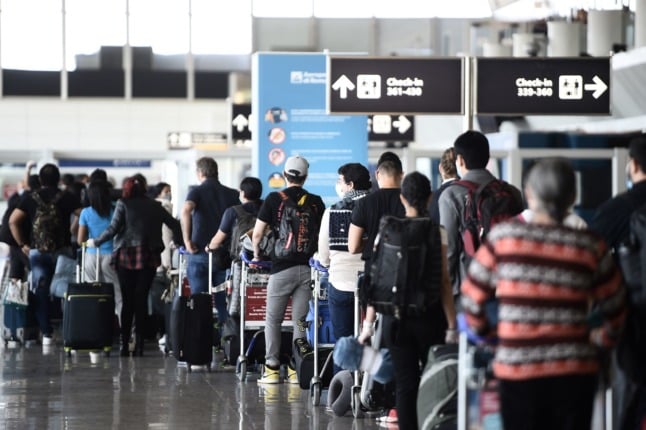
Filippo MONTEFORTE / AFP
Q: What happens if I arrive in Italy without the required documents?
The Ministry of Health website makes clear that arrivals from all List D countries, including the UK, are subject to the five-day quarantine rule if they don't have both proof of vaccination and a negative test result.
The website of the Italian embassy in Canada also says it is possible for arrivals from Canada to enter Italy without one of the required documents, but passengers who do so will be subject to a five-day quarantine, at the end of which they must take a test.
Q: What language do my certificates/test results need to be in?
A: According to a circular published to the Ministry of Health’s website:
- Vaccination certifications will be accepted in Italian, French, English, or Spanish; vaccination certificates in any other language will need to be accompanied by a notarised translation (presumably to Italian).
- All Covid recovery certificates will need to be accompanied by a notarised translation (presumably to Italian).
The guidance on the Ministry of Health’s website itself does not differentiate between different types of certificates, but simply says: “Certifications must be submitted in one of the following languages: Italian, English, French or Spanish.”
Neither the health ministry's website nor the foreign ministry's Travel Safe website currently make specific reference to Covid test results needing to be in a particular language. The Italian government has not previously required test results to be provided in Italian, English, or any particular language.
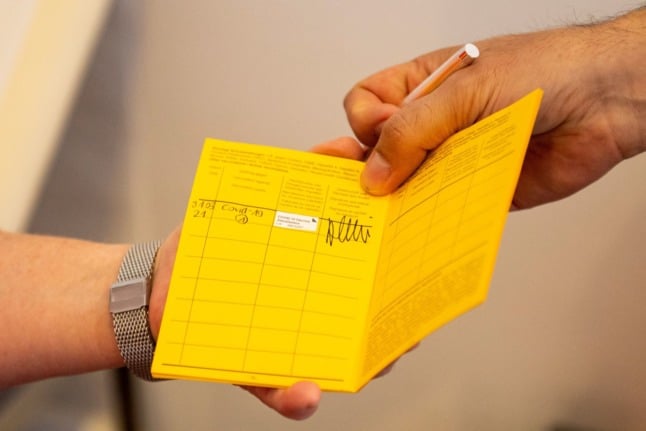
LENNART PREISS / AFP
Q: What information should my Covid vaccination or recovery certificate contain?
A: According to a circular published on the Ministry of Health’s website, vaccination certificates should provide:
- The holder’s name, surname, and date of birth.
- The type and batch of each vaccine administered.
- The date(s) on which the vaccine(s) were administered (holders must have completed a full vaccination cycle, but a Johnson & Johnson cycle is considered complete after one shot).
- The name of the State and the health authority that has issued the certificate.
All vaccines must be EMA-recognised, i.e.: Pfizer, Moderna, AstraZeneca and Johnson & Johnson.
Recovery certificates should provide:
- The holder’s name, surname, and date of birth.
- “information about the holder's past SARS-CoV-2 infection, following a positive test” (exactly what information isn’t specified, but as the certificate must be issued by a health authority, one or two lines from the authority summarising the nature of the holder’s past infection is likely to be what’s required).
- The date of the holder’s first positive Covid test (the certificate is valid for 180 days from this date).
- The name of the State and the health authority that has issued the certificate.
Q: Do I still need to complete a passenger locator form when travelling to Italy?
A: Yes. The rule requiring all passengers to complete a digital Passenger Locator Form (dPLF) before entering Italy remains in place.
One form must be completed for each adult passenger; accompanied minors can be registered on the form of the accompanying adult. Find further information about completing the form here.
One passenger who recently travelled to Italy from the US said it took around ten minutes, and advised: "I would recommend people complete the form ahead of time (before they get to the airport) to save trouble before boarding".
Q: If I come to Italy from the US via another EU country, what rules apply to me?
A: If you've been in a List D (or E) country in the 14 days before your arrival in Italy, you are subject to List D (or E) travel rules, regardless of whether you plan to transit though a country for which Italy has less stringent entry requirements.
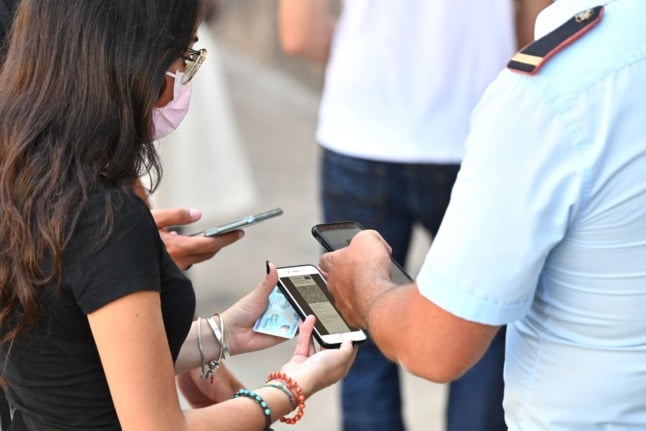
Photo: Andreas SOLARO/AFP
In other words, you must follow the strictest entry rules that apply depending on where you have been in the two weeks before your arrival in Italy.
This means that if you have been to Brazil and the US in the 14 days before your entry date, you are subject to Brazil (List E) rules; if you have been to the US and Germany, you are subject to US (List D) rules.
Check the Italian government's current restrictions on arrivals from any country using this online questionnaire from the Foreign Ministry.
Q: What counts as ‘passing through’ another country on my way into Italy?
A: Italy’s health ministry and ‘Travel Safe’ foreign ministry websites do not currently define what the government considers to count as ‘passing through’ or 'transiting in' in another country en route to Italy.
It’s safe to assume that if you have a layover in another country on your way to Italy and do not leave the airport, you are not considered to have entered that country as far as Italy’s travel rules are concerned.
If your layover involves leaving the airport eg. to stay in a hotel overnight, it’s a good idea to double-check with your airline which rules will then apply to you.
Q: What format does my vaccine certificate and negative test result need to be in?
A: You may present your Covid vaccination or recovery certificate and negative test result in either digital or paper format, according to the Italian health ministry's latest travel ordinance. That means an email shown on your phone containing your test result and/or certificate will be accepted.
Q: I'm vaccinated, but I'm travelling with children who aren't. What are the rules for us?
A: Children under six years of age are exempted from taking a pre-departure Covid test to enter Italy, according to the latest guidance from the Italian embassy in Washington; all children above this age must take the test, whether they are vaccinated or not.
Several readers have asked what the quarantine rules are for unvaccinated minors travelling with adults who are in possession of Covid vaccination or recovery certificates.
According to the Italian tourism board: "Persons under the age of 18 are exempted from the obligation of isolation (where applicable) only if they are accompanied by an adult (parent or other companion) in possession of a Covid green certificate (green pass)."
READ ALSO: What visitors need to know about getting Italy’s Covid green pass

Photo: Andreas SOLARO/AFP
Q: I'm fully vaccinated, but with mixed doses. Can I still travel to Italy?
A: To be valid for travel to Italy, your Covid vaccination certificate should have been issued by your local health authority, show that you completed your vaccination course at least 14 days before travel, and that both doses are from European Medicines Agency (EMA) approved vaccines.
Mixed vaccine doses are not uncommon in Italy, and there are no reports of residents who received mixed doses having trouble accessing Italy's 'green pass'.
However, The Local has sought confirmation from the Italian Ministry of Health that mixed dose vaccination certificates are accepted.
READ ALSO: EU recommends tighter restrictions on American tourists as US removed from Covid safe travel list
Q: How far in advance of my arrival in Italy do I need to take a test?
A: According to the health ministry's ordinance, anyone arriving from any List D country apart from the UK will need to be able to present the negative results of a test taken in the 72 hours before their arrival in Italy, in addition to other required documents.
Anyone arriving from the UK will need to take a test in the 48 hours before their arrival in the country.
Anyone arriving from a List E country, which is permitted only under certain circumstances and not for tourism purposes, will need to take a test in the 72 hours before their arrival in Italy, according to the foreign ministry's Viaggiare Sicuri (Travel Safe) website.
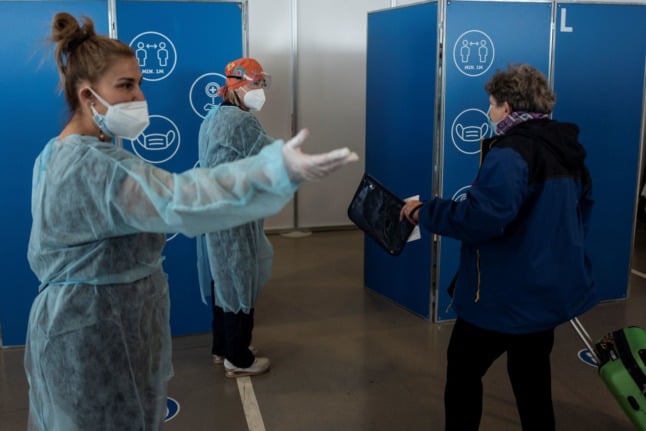
Marco Bertorello / AFP
Q: When does the window for taking a Covid test open? 72/48 hours before I arrive in Italy, or 72/48 hours before my departure to Italy?
A: The health ministry's ordinance makes clear that you will need to take the test in the 72/48 hour window (depending on which timeframe applies to you – see above) before your arrival in Italy, not your departure to the country, so make sure to factor all your travel time into your calculations.
Q: What about time differences between different countries? Are they taken into account?
A: The time difference between your country of departure and Italy is not taken into account for the purposes of validating your negative Covid test result. You must have taken your test in the 72/48 hour window before your arrival in the country, regardless of any time difference.
Q: Do I need to take a PCR test to come to Italy?
A: No. The Viaggiare Sicuri website makes clear that Italy currently accepts rapid antigen tests (known in the UK as lateral flow tests) for all arrivals from List D and E countries.
Q: Do I need to take a PCR test when I complete my quarantine in Italy?
A: No. Rapid antigen tests are valid for all those who need to take a test upon completion of their five-day (or, in the case of List E countries, 10 day) self-isolation period.
All individuals subject to quarantine in Italy are required to take a test upon completion of their quarantine period.
Q: Is the Italian government likely to change any of the rules before December 15th?
A: While the Italian government could announce changes if the health situation develops significantly, it is unlikely to revoke the recent rule changes. This has not happened before with Italy's Covid travel restrictions. So far, Italy has only lifted previous similar travel restrictions on their expiry date.
While it looks unlikely, the Local will continue to follow updates closely and report on any changes to the rules.
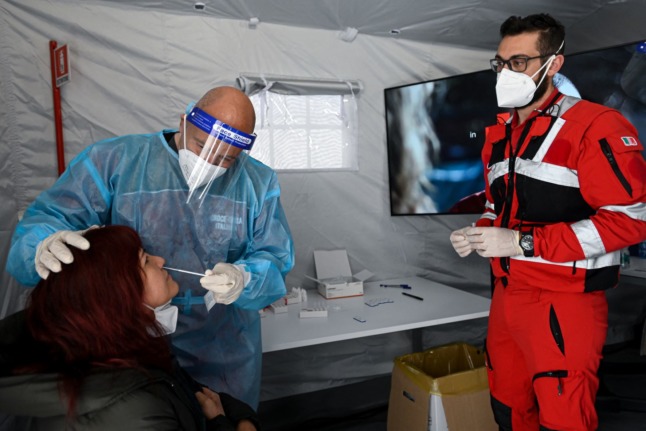
Piero CRUCIATTI / AFP
Q: How long do I need to quarantine for if I’m required to quarantine?
A: All those coming from any List D country who meet the requirements for quarantine (see above) must do so for five days, according to the ordinance.
All those arriving from any List E country must quarantine for ten days under all circumstances, according to the Viaggiare Sicuri website.
Q: If I need to quarantine in Italy, what are the rules?
A: It appears that all arrivals from List D countries who are subject to quarantine would need to follow the same five-day quarantine rules which were already in place for UK arrivals. List E country arrivals are subject to the same rules, but for a 10-day period.
READ ALSO: What are the new rules for travel to Italy from the US and Canada?
The existing rules for UK travellers state that they can quarantine anywhere they choose – you don’t need to go to a designated ‘Covid hotel’. Your own residence, a second home or holiday rental are all accepted places to self-isolate.
You can also quarantine at a friend’s house, but you should avoid close contact with anyone else living there (unless they are also prepared to observe quarantine).
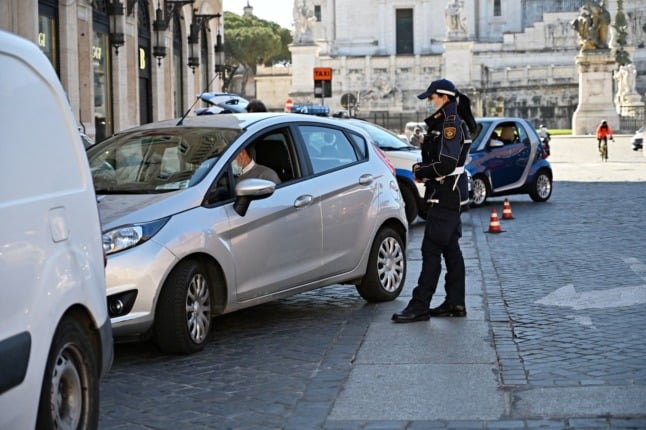
Andreas SOLARO / AFP
Hotels and private accommodation advertised on booking sites are also acceptable places to isolate for the mandatory five days, but the managers/property owners may refuse. Contact the accommodation before booking to find out what its policy is.
Wherever you decide to quarantine, you should go directly there when you arrive in Italy - by private means of transport such as a hire car or taxi - and settle in for the entire quarantine period: moving from one location to another during your isolation period would be considered a breach of quarantine.
READ ALSO: Q&A: Your questions about Italy’s quarantine for UK arrivals answered
If you are unable to find anywhere suitable to quarantine in Italy or cannot reach your destination safely, the local authorities reserve the right to put you in accommodation of their choosing, such as a designated hotel, at your expense.
Some quarantine rules may vary by local authority. For further information about quarantining in Italy, contact your local health authority or the regional Covid helpline.
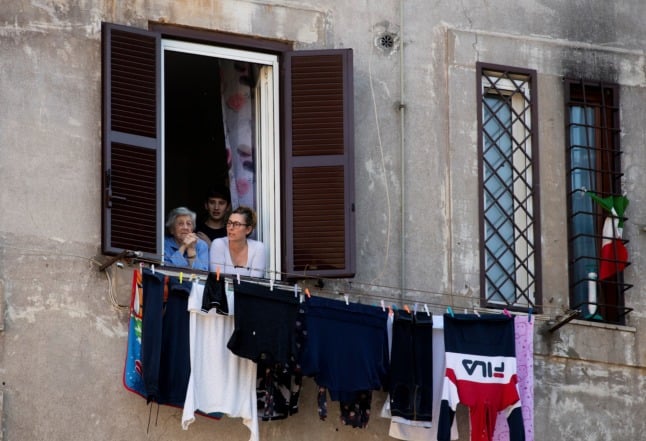
Photo: Tiziana Fabi/AFP
Q: How do I get tested to end quarantine?
A: Once your five or 10-day isolation period is over, you can leave isolation in order to get a test, as long as you have not developed any Covid-19 symptoms and your local health authority has not instructed you otherwise. Children under the age of six who have been quarantining are exempted from this requirement.
Whether the local health authority will book your test for you or you’ll need to organise your own via a private provider depends on the rules in each Italian region: ask your local area’s health authority (ASL) or the regional Covid helpline for advice.
You must continue avoiding contact with others until you receive confirmation of a negative result.
If you do get symptoms, you should remain in isolation and inform your local health authority.
See more details about getting a coronavirus test in Italy here.
For more information on the requirements for travel to Italy:
- Italian Foreign Ministry’s information page for Italian citizens returning from abroad and foreign citizens in Italy
- Italian Foreign Ministry’s ‘safe travels’ website www.viaggiaresicuri.it
- Italian Health Ministry’s travel information page.
You can also call the Italian coronavirus information line:
- From Italy: 1500 (toll-free number)
- From abroad: +39 0232008345 , +39 0283905385
Please note that The Local cannot advise on specific cases. For more information about how the rules may apply to you, see the Italian Health Ministry’s website or consult the Italian embassy in your country.
You can keep up with the latest news updates via our homepage or travel news section.
Comments (11)
See Also
This article was last updated on October 28th.
Italy's health ministry has updated its rules on international travel, after a previous ordinance introduced at the end of August expired on October 25th.
The new rules, which came into force on October 26th and will remain in place until December 15th, broadly extend the ordinance, with only minor changes in place for travellers from most countries.
What has changed?
As of August 31st, passengers from the US, Canada, Japan and Israel have had to show proof of vaccination or recovery from Covid-19 plus a negative test result to avoid quarantining on arrival (previously only one of the two had been required).
This rule remains broadly the same, but the updated ordinance names only the US, Canada and Japan as countries from which passengers may present a recovery certificate in lieu of proof of vaccination.
Passengers travelling from Israel are now included among all other List D countries, meaning only a vaccination certificate showing the holder has undergone a full vaccination cycle for at least 14 days will be accepted as valid.
With the new ordinance, a number of countries have also been moved from the less-restricted List D to the more-restricted List E.
Albania, Armenia, Bosnia and Herzegovina, Brunei, Lebanon, Moldova, Montenegro, Republic of North Macedonia, and Serbia all appear to have been removed from List D in the latest ordinance, joining the “Rest of World” in List E.
Meanwhile Bahrain, Chile, Kuwait, Rwanda, and Uruguay are new List D appearances, meaning travel is now allowed from these countries for tourism purposes.
Travel to Italy from List E countries is not permitted for tourism, but only for work, health, or study reasons, to return to a place of registered residence, or to reunite with an Italian citizen or resident with whom the passenger has a proven and stable relationship.
A ten-day quarantine is required in all cases and passengers must produce a negative result from a test taken in the 72 hours before arrival in Italy – but no vaccination or recovery certificate is needed.
Significant changes have also been made for travellers arriving from Brazil, India, Sri Lanka and Bangladesh.
Due to concerns about the high rates of Covid in these countries, they were formerly subject to their own specific travel restrictions – but with the updated ordinance, they now rejoin all other List E countries.
The previous ordinance of August 31st significantly changed the game for UK travellers, lifting a quarantine requirement for passengers who can show both proof of vaccination and a negative test result.
That rule also remains current, with no changes in place for UK travellers wanting to enter Italy.
Below are some of the questions readers are asking most frequently about Italy's current travel rules.
Q: What documents do I need to avoid having to quarantine in Italy?
A: Anyone entering Italy from the United States, Canada, or Japan or who has passed through one of these countries in the past 14 days must now present:
- Either a Covid-19 vaccination certification showing that they have completed a full vaccination cycle for at least 14 days, or a certification showing that they have recovered from Covid-19 within the past 180 days, from their local health authorities.
- And negative results for a molecular (PCR) or rapid antigen test taken in the 72 hours before their arrival in Italy.
Anyone entering Italy from any other List D country, including the UK, or who has passed through one of these countries in the past 14 days will need to present:
- A Covid-19 vaccination certification showing that they have completed a full vaccination cycle for at least 14 days from their local health authorities.
- And negative results for a molecular (PCR) or rapid antigen test taken in the 72 hours before their arrival in Italy. For UK arrivals, this is reduced to 48 hours.
All passengers arriving from any country must complete an EU passenger locator form that they can show to border officials on entry.
All arrivals from List E countries, who may not enter for tourism purposes, are subject to a ten-day quarantine under all circumstances.

Q: What happens if I arrive in Italy without the required documents?
The Ministry of Health website makes clear that arrivals from all List D countries, including the UK, are subject to the five-day quarantine rule if they don't have both proof of vaccination and a negative test result.
The website of the Italian embassy in Canada also says it is possible for arrivals from Canada to enter Italy without one of the required documents, but passengers who do so will be subject to a five-day quarantine, at the end of which they must take a test.
Q: What language do my certificates/test results need to be in?
A: According to a circular published to the Ministry of Health’s website:
- Vaccination certifications will be accepted in Italian, French, English, or Spanish; vaccination certificates in any other language will need to be accompanied by a notarised translation (presumably to Italian).
- All Covid recovery certificates will need to be accompanied by a notarised translation (presumably to Italian).
The guidance on the Ministry of Health’s website itself does not differentiate between different types of certificates, but simply says: “Certifications must be submitted in one of the following languages: Italian, English, French or Spanish.”
Neither the health ministry's website nor the foreign ministry's Travel Safe website currently make specific reference to Covid test results needing to be in a particular language. The Italian government has not previously required test results to be provided in Italian, English, or any particular language.

Q: What information should my Covid vaccination or recovery certificate contain?
A: According to a circular published on the Ministry of Health’s website, vaccination certificates should provide:
- The holder’s name, surname, and date of birth.
- The type and batch of each vaccine administered.
- The date(s) on which the vaccine(s) were administered (holders must have completed a full vaccination cycle, but a Johnson & Johnson cycle is considered complete after one shot).
- The name of the State and the health authority that has issued the certificate.
All vaccines must be EMA-recognised, i.e.: Pfizer, Moderna, AstraZeneca and Johnson & Johnson.
Recovery certificates should provide:
- The holder’s name, surname, and date of birth.
- “information about the holder's past SARS-CoV-2 infection, following a positive test” (exactly what information isn’t specified, but as the certificate must be issued by a health authority, one or two lines from the authority summarising the nature of the holder’s past infection is likely to be what’s required).
- The date of the holder’s first positive Covid test (the certificate is valid for 180 days from this date).
- The name of the State and the health authority that has issued the certificate.
Q: Do I still need to complete a passenger locator form when travelling to Italy?
A: Yes. The rule requiring all passengers to complete a digital Passenger Locator Form (dPLF) before entering Italy remains in place.
One form must be completed for each adult passenger; accompanied minors can be registered on the form of the accompanying adult. Find further information about completing the form here.
One passenger who recently travelled to Italy from the US said it took around ten minutes, and advised: "I would recommend people complete the form ahead of time (before they get to the airport) to save trouble before boarding".
Q: If I come to Italy from the US via another EU country, what rules apply to me?
A: If you've been in a List D (or E) country in the 14 days before your arrival in Italy, you are subject to List D (or E) travel rules, regardless of whether you plan to transit though a country for which Italy has less stringent entry requirements.

In other words, you must follow the strictest entry rules that apply depending on where you have been in the two weeks before your arrival in Italy.
This means that if you have been to Brazil and the US in the 14 days before your entry date, you are subject to Brazil (List E) rules; if you have been to the US and Germany, you are subject to US (List D) rules.
Check the Italian government's current restrictions on arrivals from any country using this online questionnaire from the Foreign Ministry.
Q: What counts as ‘passing through’ another country on my way into Italy?
A: Italy’s health ministry and ‘Travel Safe’ foreign ministry websites do not currently define what the government considers to count as ‘passing through’ or 'transiting in' in another country en route to Italy.
It’s safe to assume that if you have a layover in another country on your way to Italy and do not leave the airport, you are not considered to have entered that country as far as Italy’s travel rules are concerned.
If your layover involves leaving the airport eg. to stay in a hotel overnight, it’s a good idea to double-check with your airline which rules will then apply to you.
Q: What format does my vaccine certificate and negative test result need to be in?
A: You may present your Covid vaccination or recovery certificate and negative test result in either digital or paper format, according to the Italian health ministry's latest travel ordinance. That means an email shown on your phone containing your test result and/or certificate will be accepted.
Q: I'm vaccinated, but I'm travelling with children who aren't. What are the rules for us?
A: Children under six years of age are exempted from taking a pre-departure Covid test to enter Italy, according to the latest guidance from the Italian embassy in Washington; all children above this age must take the test, whether they are vaccinated or not.
Several readers have asked what the quarantine rules are for unvaccinated minors travelling with adults who are in possession of Covid vaccination or recovery certificates.
According to the Italian tourism board: "Persons under the age of 18 are exempted from the obligation of isolation (where applicable) only if they are accompanied by an adult (parent or other companion) in possession of a Covid green certificate (green pass)."
READ ALSO: What visitors need to know about getting Italy’s Covid green pass

Q: I'm fully vaccinated, but with mixed doses. Can I still travel to Italy?
A: To be valid for travel to Italy, your Covid vaccination certificate should have been issued by your local health authority, show that you completed your vaccination course at least 14 days before travel, and that both doses are from European Medicines Agency (EMA) approved vaccines.
Mixed vaccine doses are not uncommon in Italy, and there are no reports of residents who received mixed doses having trouble accessing Italy's 'green pass'.
However, The Local has sought confirmation from the Italian Ministry of Health that mixed dose vaccination certificates are accepted.
READ ALSO: EU recommends tighter restrictions on American tourists as US removed from Covid safe travel list
Q: How far in advance of my arrival in Italy do I need to take a test?
A: According to the health ministry's ordinance, anyone arriving from any List D country apart from the UK will need to be able to present the negative results of a test taken in the 72 hours before their arrival in Italy, in addition to other required documents.
Anyone arriving from the UK will need to take a test in the 48 hours before their arrival in the country.
Anyone arriving from a List E country, which is permitted only under certain circumstances and not for tourism purposes, will need to take a test in the 72 hours before their arrival in Italy, according to the foreign ministry's Viaggiare Sicuri (Travel Safe) website.

Q: When does the window for taking a Covid test open? 72/48 hours before I arrive in Italy, or 72/48 hours before my departure to Italy?
A: The health ministry's ordinance makes clear that you will need to take the test in the 72/48 hour window (depending on which timeframe applies to you – see above) before your arrival in Italy, not your departure to the country, so make sure to factor all your travel time into your calculations.
Q: What about time differences between different countries? Are they taken into account?
A: The time difference between your country of departure and Italy is not taken into account for the purposes of validating your negative Covid test result. You must have taken your test in the 72/48 hour window before your arrival in the country, regardless of any time difference.
Q: Do I need to take a PCR test to come to Italy?
A: No. The Viaggiare Sicuri website makes clear that Italy currently accepts rapid antigen tests (known in the UK as lateral flow tests) for all arrivals from List D and E countries.
Q: Do I need to take a PCR test when I complete my quarantine in Italy?
A: No. Rapid antigen tests are valid for all those who need to take a test upon completion of their five-day (or, in the case of List E countries, 10 day) self-isolation period.
All individuals subject to quarantine in Italy are required to take a test upon completion of their quarantine period.
Q: Is the Italian government likely to change any of the rules before December 15th?
A: While the Italian government could announce changes if the health situation develops significantly, it is unlikely to revoke the recent rule changes. This has not happened before with Italy's Covid travel restrictions. So far, Italy has only lifted previous similar travel restrictions on their expiry date.
While it looks unlikely, the Local will continue to follow updates closely and report on any changes to the rules.

Q: How long do I need to quarantine for if I’m required to quarantine?
A: All those coming from any List D country who meet the requirements for quarantine (see above) must do so for five days, according to the ordinance.
All those arriving from any List E country must quarantine for ten days under all circumstances, according to the Viaggiare Sicuri website.
Q: If I need to quarantine in Italy, what are the rules?
A: It appears that all arrivals from List D countries who are subject to quarantine would need to follow the same five-day quarantine rules which were already in place for UK arrivals. List E country arrivals are subject to the same rules, but for a 10-day period.
READ ALSO: What are the new rules for travel to Italy from the US and Canada?
The existing rules for UK travellers state that they can quarantine anywhere they choose – you don’t need to go to a designated ‘Covid hotel’. Your own residence, a second home or holiday rental are all accepted places to self-isolate.
You can also quarantine at a friend’s house, but you should avoid close contact with anyone else living there (unless they are also prepared to observe quarantine).

Hotels and private accommodation advertised on booking sites are also acceptable places to isolate for the mandatory five days, but the managers/property owners may refuse. Contact the accommodation before booking to find out what its policy is.
Wherever you decide to quarantine, you should go directly there when you arrive in Italy - by private means of transport such as a hire car or taxi - and settle in for the entire quarantine period: moving from one location to another during your isolation period would be considered a breach of quarantine.
READ ALSO: Q&A: Your questions about Italy’s quarantine for UK arrivals answered
If you are unable to find anywhere suitable to quarantine in Italy or cannot reach your destination safely, the local authorities reserve the right to put you in accommodation of their choosing, such as a designated hotel, at your expense.
Some quarantine rules may vary by local authority. For further information about quarantining in Italy, contact your local health authority or the regional Covid helpline.

Photo: Tiziana Fabi/AFP
Q: How do I get tested to end quarantine?
A: Once your five or 10-day isolation period is over, you can leave isolation in order to get a test, as long as you have not developed any Covid-19 symptoms and your local health authority has not instructed you otherwise. Children under the age of six who have been quarantining are exempted from this requirement.
Whether the local health authority will book your test for you or you’ll need to organise your own via a private provider depends on the rules in each Italian region: ask your local area’s health authority (ASL) or the regional Covid helpline for advice.
You must continue avoiding contact with others until you receive confirmation of a negative result.
If you do get symptoms, you should remain in isolation and inform your local health authority.
See more details about getting a coronavirus test in Italy here.
For more information on the requirements for travel to Italy:
- Italian Foreign Ministry’s information page for Italian citizens returning from abroad and foreign citizens in Italy
- Italian Foreign Ministry’s ‘safe travels’ website www.viaggiaresicuri.it
- Italian Health Ministry’s travel information page.
You can also call the Italian coronavirus information line:
- From Italy: 1500 (toll-free number)
- From abroad: +39 0232008345 , +39 0283905385
Please note that The Local cannot advise on specific cases. For more information about how the rules may apply to you, see the Italian Health Ministry’s website or consult the Italian embassy in your country.
You can keep up with the latest news updates via our homepage or travel news section.
Join the conversation in our comments section below. Share your own views and experience and if you have a question or suggestion for our journalists then email us at [email protected].
Please keep comments civil, constructive and on topic – and make sure to read our terms of use before getting involved.
Please log in here to leave a comment.